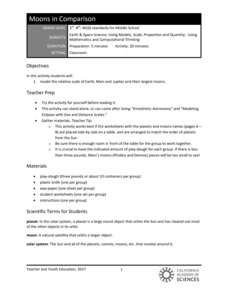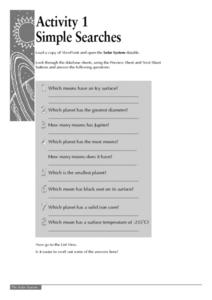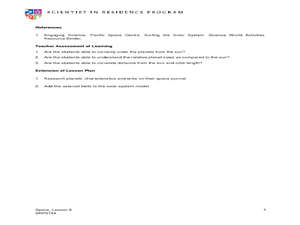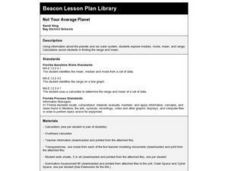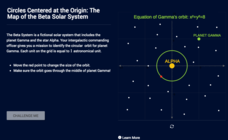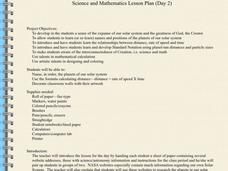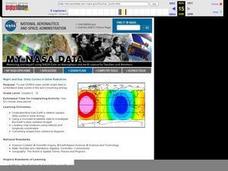Curated OER
Planet Magic Number
This is a terrific activity! Wow! Lots of great learning going on here. Not only do your pupils have to do a bunch of research in order to fill in the planetary table, they have to do some math as well, which will tell them if their...
Curated OER
Schools Going Solar
If your school has a photovoltaic system, you can use this lesson plan to guide learners through an investigation of the factors affecting performance. Familiarize yourself with the data acquisition system, and then provide data for your...
California Academy of Science
Moons in Comparison
Just how big is Earth's moon? With a hands-on simulation, scholars use Play-Doh to model the sizes of the planets Earth, Mars, Jupiter, and their moons. They make predictions as a class, work together to make their models, and discuss...
Curated OER
Simple Searches
For this space worksheet, students load a copy of ViewPoint and open the Solar System datafile. There they look through database sheets, using the Preview Sheet and Next Sheet buttons and respond to 8 questions. Then students do some...
Curated OER
The Solar Cycle
Learners research the solar cycle. In this Science lesson, students use the internet to investigate the solar cycle. Learners produce a spreadsheet and graph from the information collected.
101 Questions
Neptune
Examine an innovative approach to a large-scale model. Pupils across the state of Maine teamed up to create a model of the solar system that spans 40 miles. Put thinking skills to work within your classes as they make the calculations to...
NASA
Solar Systems: Sequences and Probabilities
In this sequences and probability activity, students solve 3 problems by writing out all the possibilities for the solution and they use probability to find their answers. They determine the probability of solar flares happening on a...
Curated OER
You Are Here
Students determine the relative size and distance of the planets in the solar system. They use ratios in their mathematical calculations to make models of the planets after discussing the relative sizes of the planets. They keep a...
Curated OER
Space: Our Star, the Sun, and Its Friends, the Planets
Students examine the solar system. In this space lesson, students identify the order of the planets and their relative size to the sun. Students create a scale model of our solar system using a variety of household objects.
Curated OER
Details from an Exploding Star
In this nebula worksheet, students read about the Crab Nebula and calculate the average speed of the expanding gas. They determine the size of the smallest clumps of gas and they draw the diameter of the solar system to scale.
Curated OER
Not Your Average Planet
Fourth graders explore median, mode, mean, and range using information about the planets and our solar system.
Curated OER
Asteroids Between Mars and the Sun
In this asteroids of the solar system worksheet, students observe a diagram showing all the minor planets found in the orbit of Mars. Students answer 4 questions about the minor planets inside the orbit of other planets, they find the...
Teach Engineering
Energy Systems
Is electricity created in the outlet? Using posters of several energy systems, collaborative groups identify and describe the parts of their systems. The groups also look at the environmental impacts of the systems and present their...
Alabama Learning Exchange
Inner and Outer Planets
Students explore the solar system. For this planets lesson, students learn about the other planets in the solar system. They watch a video clip from National Geographic on the solar system, compare and contrast the planets and create a...
Alabama Learning Exchange
The Moon
Young scholars explore the phases of the moon. In this solar system lesson, students listen to several books about the moon including The Moon Book by Gail Gibbons. Young scholars complete a KWL activity concerning the phases of the moon...
Curated OER
Destination Outer Space
Learners investigate space travel. In this space travel lesson students examine space exploration history, engineers and scientists involved in space exploration, and Newton's third law of motion. Learners make rockets.
Baylor College
Using Heat from the Sun
Let's heat things up! This simple experiment demonstrates for students the important role the sun plays in providing the earth with energy. Place one cup of water in direct sunlight and one in shade, then take measurements in order to...
CK-12 Foundation
Circles Centered at the Origin: The Map of the Beta Solar System
Calculate galactic orbits in a far-out resource. Pupils drag a point on a circle to graph the orbit of a fictional planet. Using the equation, they find points through which the orbit passes. To finish the simulation, users determine the...
Curated OER
The Solar System
Students research the characteristics of planets in our solar system. In this space science lesson, students create a solar system model with each planet arranged according to their distance from the sun. They solve problems using the...
Curated OER
A Tour of the Solar System
Students construct a spacecraft out of Lego blocks and other materials. They work on their models in small groups while building. They become familar with the planets while working cooperatively.
Curated OER
Exploring The Neighborhood of the Solar System
Students explain why exploring the universe for life on other planets is an important field of study. They use mathematical formulas to calculate the temperatures of planets as it relates to their distance from the sun. Students use...
Curated OER
History of Our Solar System Time Line
Ninth graders explore the concept of ratios. In this ratio lesson, 9th graders construct a to scale time line that starts at the beginning of time. Students determine the correct placement of big events in time such as when the dinosaurs...
Curated OER
NIGHT AND DAY: DAILY CYCLES IN SOLAR RADIATION
High schoolers examine how Earth's rotation causes daily cycles in solar energy using a microset of satellite data to investigate the Earth's daily radiation budget and locating map locations using latitude and longitude coordinates.
CK-12 Foundation
Scientific Notation: Light Years to Centaurus Constellation
Connect scientific notation to a real-life situation. Measuring distances in our solar system require large numbers. As pupils make conversions using these large numbers, they begin to see the necessity of scientific notation. They...
Other popular searches
- Solar System Math Lessons
- Solar System Math Graph
- Solar System Math Age
- Solar System Math Ration
- Solar System Math Lessons'
- Solar System Math Worksheets
- Math Solar System
- Math Science Solar System
- Math and Science Solar System
- Solar System Math Lesson Plans
- Solar System Mathematics




